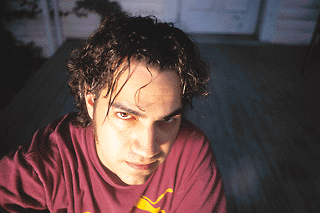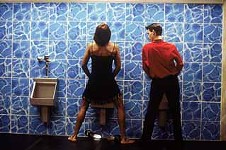High Road Construction Ahead
Thomas Pallotta and Delta-9
By Russell Smith, Fri., Jan. 17, 1997
 High Road director and Delta-9 main man Tommy Pallotta photograph by Minh Carrico |
Austin-based independent filmmaker Thomas Pallotta is still cutting his teeth as an artist, but he's already gained a couple of key insights into his chosen profession:
1. Raging against the Hollywood machine is not only a serious rush but a sacred American right guaranteed by the First Amendment; and
2. Equally guaranteed is the machine's right to kick your ass in retaliation -- or at least relegate your career to slow death through benign neglect.
The 28-year-old Pallotta, director and co-producer of the 1995 feature film, The High Road, returned several times to these ideas during a New Year's Eve interview. Nursing a tall cappuccino in a downtown coffeeshop and gazing out into darkening streets that would soon fill with Acuras and Pathfinders bearing champagne-stoked swells, he summed up in one sentence the challenge facing Delta-9, his budding production and distribution company.
"Why should we expect [Hollywood studios and distributors] to embrace a bunch of artists like us, who are flagrantly rejecting everything they stand for?"
 |
Why indeed? But as obvious as this answer seems, the UT-educated Pallotta admits that his inevitable head-on crash with reality was slow in coming. For a giddy period last summer, culminating in The High Road's well-received June 28 screening at New York City's Lincoln Center, Pallotta and collaborators Jack Meredith (screenwriter), David Smith (co-producer), and Deborah Lewis (director of photography) were in indie film heaven. Using amateur actors, some recruited out of Austin bars, and a Sam's Club budget of less than $24,000, they created a surprisingly polished debut movie filled with spiky, aphoristic humor and uncompromisingly dark and gritty portraits of drug-deranged youth. The early reviews were good, and visions of Linklater/Rodriguez acclaim and worldwide distribution deals capered in the young upstarts' heads.
But their ejection from this lotus-eater's land was abrupt and harrowing. One day after being the toast of an appreciative Lincoln Center Independents Night crowd, Smith, 31, died in his sleep from a combination of alcohol and drugs he'd consumed in celebratory parties.
"It was such an absurd thing," Pallotta says. "There was nothing abnormal about what David did that night, nothing that seemed all that excessive. He just didn't wake up. It's possible that the stress of all the long hours he'd been working might have overtaxed his body, but we'll probably never know."
Smith's death was a dark omen of The High Road's future. Potential distributors, spooked by the film's morally unjudgmental treatment of illegal drug use, embraced it with roughly the same affection as a musical comedy on the career of Jeffrey Dahmer. Their squeamishness is understandable, at least from the commercial standpoint. The High Road's storyline, which basically consists of four disaffected slacker types driving around Texas getting royally fucked up on a Babette's Feast of mind-altering substances, is jarringly matter-of-fact in its portrayal of their pharmaceutical exploits. Even more than Trainspotting, The High Road acknowledges the nasty little secret that most folks like getting high in some form or fashion, and that severe derangement of the senses can sometimes lead to useful insights.
"Since David's death, I've thought a lot about how the message [about drugs] comes out of my film," Pallotta admits. "But in the end, I stand by it. I don't see either an endorsement or condemnation of drugs in The High Road. People just have to see it and make their own judgments."
But as it soon became clear, very few people were going to see the film unless Pallotta and Meredith took it directly to them. So Delta-9, originally an ad-hoc production company for The High Road, began to sprout new tendrils, including a nascent distribution outlet through which the filmmakers hope to market their own films and those of other indie producers. Flush with DIY zeal, Pallotta and Meredith continued to expand their vision for D9. From their office space on Congress Avenue they now operate a freeform artistic "syndicate" that boasts a digital editing studio, a World Wide Web page full of info and resource links for indie moviemakers -- and a critical mass of almost Red Guardesque fervor about the potential of alternative moviemaking.
 Delta-9 |
Their website (http://www.eden.com/~delta-9) bristles with Pallotta's polemical prose on sundry film-related topics including:
* The director-as-star syndrome ("D9 thinks it's time to put the obsolete icon of auteurism to sleep once and for all. Movies are a collaborative effort. The idea that one person... is solely responsible for a movie's completion seems antiquated, but old marketing strategies die hard.")
* The vérité acting style of The High Road's characters ("Sick and tired of the histrionics of the Method, we opted for the hyperrealism of the Huston/Buñuel approach where most or all of the coaching occurs during casting... `Just say it flat,' we kept saying, hoping that the lyricism of the dialogue, coupled with casting for type, would compensate for any lack of experience. Any work that carries its own negation postpones the day of recuperation.")
* The Hollywood System ("...so busy scratching each others' backs, lower and lower to reach the bottom line, that the end products seldom satisfy more than a rumbling flatulence.")
Contrary to his bomb-heaving Internet persona, Pallotta in the flesh seems almost disappointingly calm and reasonable. A slight, dark-featured guy with a reflective turn of mind appropriate for a philosophy major (which he was in his UT undergraduate days), he sheepishly admits that much of his Web sloganeering is designed more to provoke discussion than to delineate a consistent view of life and art.
"That's one of the great things about the Internet, though. It's a community of people with strong ideas, and a great place to air them out. The Net is the most obvious way to reach grassroots, disenfranchised filmgoers and filmmakers."
Delta-9, as Pallotta envisions it, will connect these "disenfranchised" millions and build a sense of community among people who are tired of being spoon-fed Twister/Daylight/Jingle All the Way excreta by "pinheads following tried and true methods of marketing."
If this odd combination of blast-furnace anger and New Frontier idealism seems familiar, it may be the obvious similarity between the modern cinema underground and the Seventies and Eighties punk music movement. As with the punks of yore, like-minded movie malcontents tend to find each other and plot insurrection against the established order. Pallotta and Meredith met in the early Nineties while both were working on Richard Linklater's Slacker. Both were already hopelessly lost to their filmic obsessions: Jack was a movie reviewer for The Daily Texan and Tommy had managed the Dobie Theatre and done programming for the Austin Film Society. David Smith, the third corner of the original Delta, met Pallotta in a French class that both were taking. "He was the wiseass with dreadlocks and a skateboard who sat on the back row," Tommy recalls. "I liked him 'cause he was the only one who laughed at the jokes I'd make in class."
Talks among the three rapidly progressed from unproductive Hollywood-sucks-dead-rats barroom bellyaching to a more constructive resolve to pool their resources and create films more in tune with their sensibilities. "One thing that keeps us motivated is the enormous gap between the kind of movies we'd like to see and the movies that are actually being produced," Pallotta writes in his online history of Delta-9.
This resolve, Pallotta hopes, will lead to brand loyalty among the consumers of films from the D9 syndicate. "I want people to feel about Delta-9 movies the same way they might feel about a record label like Sub Pop or Matador -- that because of their familiarity with our products and aesthetic sensibilities they'll at least give our films a chance. I don't mean that we'll always be making the same kind of movies, just that there'll be a certain attitude they'll recognize."
Upcoming projects -- all based on scripts written by the 36-year-old Meredith -- include: Journeyman, Suitable for Framing, and Sierra Blanca. The former is described in a D9 press kit as "a gritty, darkly funny buddy picture" about two construction workers named Jerry and Hank who "push each other toward a variety of psychosexual edges, the ultimate horizon being murder." John Cusack is reportedly interested in playing Jerry and Christopher Walken has talked with the D9 braintrust about the role of Hank's uncle.
Suitable is a noirish-sounding legal drama and Sierra Blanca is a contemporary Western thriller involving livestock mutilation and dope-smuggling.
 |
Delta-9's punk/indie music analogy carries into a communal artistic support network that Meredith and Pallotta are building through their burgeoning e-mail address books, association memberships, and their participation in the AIVF Austin Salon, a series of free nuts 'n' bolts workshops that D9 hosts in Austin for local filmmakers, screenwriters, and others seeking a toehold in the movie industry. The Salon, sponsored by the Association of Independent Video and Filmmakers, meets the last Monday of each month, most often at the Electric Lounge.
As with the early Austin punk scene, where humble spaces such as Raul's, Duke's, and the Continental Club served as focal points for the burgeoning energy of a new musical form, Pallotta and Meredith hope to work with other film distributors in creating alternate forums for movies that just don't fit in with that MultiOmniMegaCineplex XII marketing concept.
"We're trying to dialog with people on ways to `event-ize' independent films by placing them in colleges, museums, film society screenings, and festivals," Pallotta says. "You don't get the mass audience that way, but you develop awareness. It gives you publicity and ultimately you can go for corporate sponsorships and other sources of funding for projects. By no means do we have the strategies all worked out, but these are the directions we want to move."
The wide open, seat-of-the-pants D9 concept can encompass pretty much anybody or anything that piques Meredith and Pallotta's interest. One recent example: Bob Sabiston, a computer animator who Pallotta met through his roommate, has agreed to become an artist-in-residence at Delta-9. Alone with his interviewer in a sparsely decorated studio on New Year's Eve, Pallotta cued up one of Sabiston's tapes and watched the hallucinatory images stream across the screen. "This guy's fucking amazing! I can't wait to see him at work..."
As the tape reached its end, New Year's party noises began to rise from the streets below and I offered my apologies for having to leave for a dinner date. (Pallotta, as is apparently the case on most nights, was planning to work late.) Before leaving, I took one last look around the Delta-9 studio space. The detritus of the creative process -- tapes, CDs, recording equipment, white screens, and markers -- lay scattered around the sparsely decorated room. It occurred to me that whether or not D9 exists in another year (or three, or five), processes have already been set in motion that are changing the film industry forever. I looked at the Macintosh screens glowing in the shadows and imagined the electronic webwork linking them to other computers in similar spaces around the country. Right now, the Delta-9s of the world are flying under Hollywood's radar coverage, but someday soon, that's going to change. There's something intrinsically unstoppable about any activity motivated chiefly by love.
Tommy Pallotta, whose life work depends on the collaborative efforts of men and women who are prepared to shed their creative blood with no guarantee of financial reward, explains it best.
"Sometimes, when we were working on The High Road, I found myself wondering `What on earth is keeping these people here?' I think the answer is that here is an opportunity for them to try something they may never get the chance to do again, and that's a powerful motivating force.
"This is a place where people can test their limits."
The High Road opens for a theatrical run on Friday, January 17 at the Dobie Theatre. Check this issue's "Film Listings" for showtimes or call 472-FILM.
The January AIVF meeting is scheduled for Monday, January 27, 8pm at the Electric Lounge and is open to the public. The evening's topic is "Turning Lead into Gold: Cinematographers Reveal Their Secrets on How to Shoot Low-Budget Films Without Spending Millions," featuring panelists Lee Daniel (Slacker, Dazed and Confused, Phil Curry (Ruta Awakening, Purgatgory County), and Deb Lewis (The High Road, The Naughty Ones). Call 469-1799 for more info.








